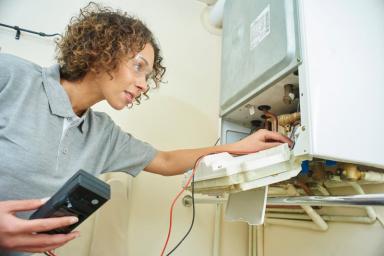Save £2.5-4k when you don't replace your boiler

Even with higher gas prices, we have found that a new boiler will rarely save you enough money to recoup the upfront cost of installation over its lifetime, either in energy savings or reduced maintenance costs. We tackle the three reasons that might encourage you to consider changing your boiler too soon.
A culture of over-replacement
We seem to have a culture of over-replacement of boilers in the UK whereby households change their boiler when it still has years of life left in it. Over a quarter of homes have a boiler that is less than 3 years old and 75% of homes have a boiler that is 12 years old or less*. In Germany 40% of boilers are over 20 years old**. Boilers should last 22 years^.
We challenge some of the reasons why a boiler might be swapped out prematurely, because this costs households £2,500 - £4,000 for little to no benefit. The three most common drivers that we hear about are:
- A new boiler saves you money
- Boilers only last 10-15 years
- Parts are not available for older boilers
1: A new boiler saves you money
The energy crisis has driven most households to consider what energy they use and where they can save money. As our heating bills account for a high proportion of our energy use, so we have naturally questioned the efficiency of our older boilers and asked whether a new boiler would save us money.
Since 2005 new boilers had to have a minimum efficiency of A-rated, which means around 90% of homes already have an A-rated boiler. A-rated means it can work at over 90% efficiencies.
Whilst technology has evolved over the last 18 years, the energy savings available from replacing an A-rated boiler with another A-rated boiler are still small and sometimes zero. Even a 15% saving of around £143 on the average gas bill (assuming 12,000kWh), would struggle to payback the upfront cost of installation, typically £2,250 - £3,660 (excluding the cost of the heating control)^^, over its lifetime, if ever.
Boilers older than 25 years may offer a better savings potential, but it is just potential as efficiencies rely on so many more things that simply swapping the boiler. Assuming the new boiler is fully optimised, a £250 saving would be a 10-year payback on the cheapest installation. However according to our second driver, this would be when you will need to replace the boiler again.
Both ‘payback’ scenarios rely on the new boiler running optimally. 100% of customers coming through our business for advice have an oversized and unoptimised boiler and the solution is not to change it for another oversized and unoptimised boiler, rather to keep it and spend a much smaller sum making it more efficient. Our Boiler Efficiency Check service does just that and saves our customers thousands of pounds each time we give them the confidence to keep their existing boiler.
2: Boilers only last 10-15 years
According to an EU report, domestic gas boilers should last 22 years^, yet many manufacturers give lifespans of just 10-15 years, which means boilers are deemed to be “approaching their end of their useful life” as they approach 10 years, when they are in fact just halfway through.
Like boiler oversizing, a lack of guidance on true lifespan has allowed this understanding to grow and it is now widely believed that new boilers "just do not last as long as old boilers". This is simply not true. We work with households that have a 15-20 year old boiler still going strong and with very few problems and yet they are being encouraged to change it due to age.
3: Parts are “getting scarce”
Many of our customers are told that the parts are 'getting scarce' for their older boiler. Our research consistently shows that even 20 year old boilers have very good parts availability.
Understandably customers do still feel anxious about breakdown and reason that fitting a new boiler under warranty will provide greater peace of mind and lower annual costs.
We advise in these instances to consider a maintenance contract. Boiler maintenance providers offer boiler cover for around £200 per year, which will include an annual service which typically costs around £85. Many providers do not have an age limit to the boilers they take onto contract and are totally invested in keeping your boiler going.
As a new boiler will still require an annual boiler service to validate the extended warranty at a cost of around £85 per year, so the extra cost for a maintenance contract is £115 per annum. Over 10 years this is still less than half the cost of the cheapest boiler installation.
It is also worth noting that call out times to any broken-down boiler will rely on the availability of engineers regardless of whether you have a boiler warranty or a boiler maintenance contract.
Long term trends and 'hydrogen-ready' boilers (that are not ready)
It will be possible to buy a gas boiler until about 2035, however it is likely that by that time a heat pump will be much cheaper to run so the natural choice for households will be to fit a heat pump. Whilst hydrogen is widely discussed as an alternative, most studies conclude that it has a very limited role to play for domestic heating, if any.
Boilers are already marketed as 'hydrogen-blend-ready' and all that means is that if a small amount of hydrogen is ever mixed into our existing gas supplies, the boiler can cope without adjustment. What it actually means is that all boilers are hydrogen-blend-ready and this is not a reason to buy a new boiler.
No boilers are yet 'hydrogen-ready' or 'hydrogen-conversion-ready' and will not be for many years.
